![]()
![]()
![]()
Use LEFT and RIGHT arrow keys to navigate between flashcards;
Use UP and DOWN arrow keys to flip the card;
H to show hint;
A reads text to speech;
39 Cards in this Set
- Front
- Back
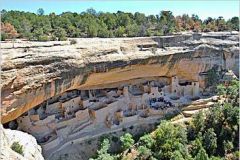
Anasazi
|
Ancient Pueblo peoples or Ancestral Pueblo peoples were an ancient Native American culture centered on the present-day Four Corners area of the United States, comprising southern Utah, northeastern Arizona, northern New Mexico, and southwestern Colorado. They lived in a range of structures, including pit houses, pueblos, and cliff dwellings designed so that they could lift entry ladders during enemy attacks, which provided security. Archaeologists referred to one of these cultural groups as the Anasazi, although the term is not preferred by contemporary Pueblo peoples.
|
|
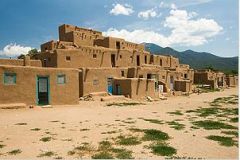
Pueblo Revolt
|
The Pueblo Revolt of 1680, or Popé's Rebellion, was an uprising of most of the Pueblo Indians against the Spanish settlers in the province of Santa Fe de Nuevo México, present day New Mexico. The Pueblo killed 400 Spanish and drove the remaining 2,000 settlers out of the province. Twelve years later the Spanish returned and were able to reoccupy New Mexico with little opposition.
|
|

Cherokee
|
The Cherokee are a Native American people historically settled in the Southeastern United States (principally Georgia, North Carolina, and East Tennessee). Their language is an Iroquoian language. In the 19th century, historians and ethnographers recorded their oral tradition that told of the tribe having migrated south in ancient times from the Great Lakes region, where other Iroquoian-speaking peoples were located. They began to have contact with European traders in the 18th century.
|
|

Iroquois
|
The Iroquois, also known as the Haudenosaunee or the "People of the Longhouse",are a league of several nations and tribes of indigenous people of North America. After the Iroquoian-speaking peoples of present-day central and upstate New York coalesced as distinct tribes, by the 16th century or earlier, they came together in an association known today as the Iroquois League, or the "League of Peace and Power". The Iroquois are a matrilineal society. They have clan mothers, or main women of the leagues.
|
|
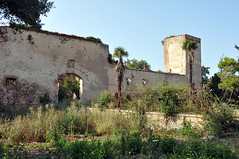
Encomienda
|
The encomienda (Spanish pronunciation: was a legal system that was employed mainly by the Spanish crown during the Spanish colonization of the Americas to regulate Native American labor. In the encomienda, the Spanish crown granted a person a specified number of natives for whom they were to take responsibility. In theory, the receiver of the grant was to protect the natives from warring tribes and to instruct them in the Spanish language and in the Catholic faith: in return they could extract tribute from the natives in the form of labor, gold, or other products. In practice, the difference between encomienda and slavery could be minimal. Many natives were forced to do hard labor and subjected to extreme punishment and death if they resisted.
|
|

Bartolome de las Casas
|
Bartolomé de las Casas, O.P. was a 16th-century Spanish historian, social reformer and Dominican friar. He became the first resident Bishop of Chiapas, and the first officially appointed "Protector of the Indians". His extensive writings, the most famous being A Short Account of the Destruction of the Indies and Historia de Las Indias, chronicle the first decades of colonization of the West Indies and focus particularly on the atrocities committed by the colonizers against the indigenous peoples.
|
|
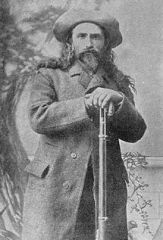
Coureurs de bois
|
A coureur des bois a coureur de bois (French pronunciation, runners of the woods; plural: coureurs de bois) was an independent entrepreneurial French-Canadian woodsman who traveled in New France and the interior of North America. They ventured into the woods usually to trade various European items for furs, especially beaver pelts, and along the way, learned the trades and practices of the Native people who inhabited there.
|
|
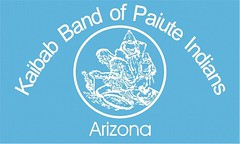
Iroquois Confederacy
|
The Iroquois, also known as the Haudenosaunee or the "People of the Longhouse", are a league of several nations and tribes of indigenous people of North America. After the Iroquoian-speaking peoples of present-day central and upstate New York coalesced as distinct tribes, by the 16th century or earlier, they came together in an association known today as the Iroquois League, or the "League of Peace and Power". The Iroquois are a matrilineal society. They have clan mothers, or main women of the leagues.
|
|
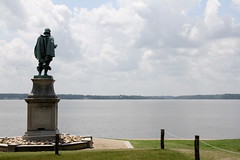
Jamestown
|
Jamestown was a settlement in the Colony of Virginia, the first permanent English settlement in the Americas. Established by the Virginia Company of London as "James Fort" on May 14, 1607 (O.S., May 24, 1607 N.S.), and considered permanent after brief abandonment in 1610, it followed several earlier failed attempts, including the Lost Colony of Roanoke. Jamestown served as the capital of the colony for 83 years, from 1616 until 1699.
|
|
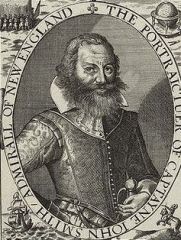
Captain John Smith
|
John Smith Admiral of New England was an English soldier, explorer, and author. He was knighted for his services to Sigismund Bathory, Prince of Transylvania and his friend Mózes Székely. He was considered to have played an important part in the establishment of the first permanent English settlement in North America. He was a leader of the Virginia Colony (based at Jamestown) between September 1608 and August 1609, and led an exploration along the rivers of Virginia and the Chesapeake Bay. He was the first English explorer to map the Chesapeake Bay area and New England.
|
|
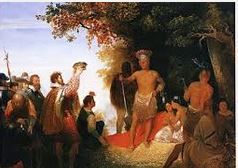
Powhatan Confederacy
|
The Powhatan (also spelled Powatan and Powhaten) is the name of a Virginia Indian confederation of tribes.[1] It may also refer to the leader of those tribes, commonly referred to as Chief Powhatan. It is estimated that there were about 14,000–21,000 Powhatan people in eastern Virginia when the English settled Jamestown in 1607.[2] They were also known as Virginia Algonquians, as they spoke an eastern-Algonquian language known as Powhatan or Virginia Algonquin.
|
|
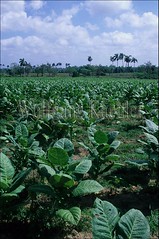
Cash Crops
|
A cash crop is an agricultural crop which is grown for sale, for profit. It is typically purchased by parties separate from a farm. The term cash crop is applied exclusively to the agricultural production of plants; animal agriculture is not a part of the terminology. The term is used to differentiate marketed crops from subsistence crops, which are those fed to the producer's own livestock or grown as food for the producer's family. In earlier times cash crops were usually only a small (but vital) part of a farm's total yield, while today, especially in the developed countries, almost all crops are mainly grown for revenue. In least developed countries, cash crops are usually crops which attract demand in more developed nations, and hence have some export value.
|
|

Indentured Servants
|
Farmers, planters, merchants,and shopkeepers in the American colonies found it very difficult to hire free workers, primarily because it was so easy for potential workers to set up their own farms. Consequently, a common solution was to transport a young worker from England or Germany, who would work for several years to pay off the debt of their travel costs. During the indenture period the servants were not paid wages, but were provided with food, accommodation, clothing and training. The indenture document specified how many years the servant would be required to work, after which they would be free. Terms of indenture ranged from one to seven years with typical terms of four or five years.
|
|
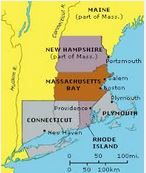
Chesapeake Colonies
|
The Chesapeake Colonies were the Colony and Dominion of Virginia, later the Commonwealth of Virginia, and Province of Maryland, later Maryland, both colonies located in British America and centered around the Chesapeake Bay.
|
|
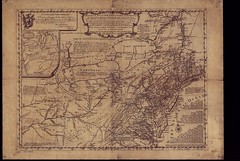
Middle Colonies
|
The Middle Colonies comprised the middle region of the Thirteen Colonies of the British Empire in North America. In 1776 during the American Revolution, the Middle Colonies became independent of Britain as the states of New Jersey, Pennsylvania, New York, Maryland, and Delaware.
|
|
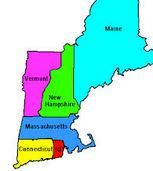
New England Colonies
|
The New England Colonies of British America included the colonies of Massachusetts Bay Colony, Connecticut Colony, Colony of Rhode Island and Providence Plantations and Province of New Hampshire. They were part of the Thirteen Colonies including the Middle Colonies and the Southern Colonies. These were early colonies of what would later be the states in New England. Captain John Smith, of Pocahontas fame, was the author of "A Description of New England" published in 1616. Which is credited with first applying the term "New England" to coastal lands of North America from the Long Island Sound to Newfoundland.
|
|
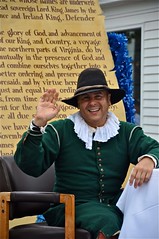
Mayflower Compact
|
The Mayflower Compact was the first governing document of Plymouth Colony. It was written by the Separatists, also known as the "Saints", fleeing from religious persecution by King James of Great Britain. They traveled aboard the Mayflower in 1620 along with adventurers, tradesmen, and servants, most of whom were referred to as "Strangers".
|
|
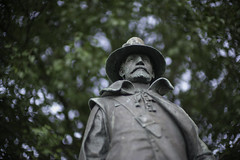
William Bradford
|
William Bradford He was an English Separatist leader in Leiden, Holland and in Plymouth Colony. He was a signatory to the Mayflower Compact and served as Plymouth Colony Governor five times covering about thirty years between 1621 and 1657. His journal 'Of Plymouth Plantation' covering the period from 1620 to 1657 in Plymouth Colony is an important historic document
|
|
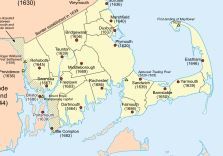
Plymouth
|
Plymouth Colony (sometimes New Plymouth, or Plymouth Bay Colony) was an English colonial venture in North America from 1620 to 1691. The first settlement of the Plymouth Colony was at New Plimoth, a location previously surveyed and named by Captain John Smith. The settlement, which served as the capital of the colony, is today the modern town of Plymouth, Massachusetts. At its height, Plymouth Colony occupied most of the southeastern portion of the modern state of Massachusetts.
|
|

John Winthrop
|
John Winthrop – 26 March 1649) was a wealthy English Puritan lawyer and one of the leading figures in the founding of the Massachusetts Bay Colony, the first major settlement in New England after Plymouth Colony. Winthrop led the first large wave of migrants from England in 1630, and served as governor for 12 of the colony's first 20 years of existence. His writings and vision of the colony as a Puritan "city upon a hill" dominated New England colonial development, influencing the government and religion of neighboring colonies.
|
|
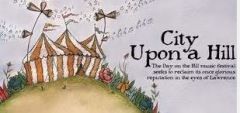
“City Upon a Hill”
|
A City upon a Hill is a phrase from the parable of Salt and Light in Jesus's Sermon on the Mount. In Matthew 5:14, he tells his listeners, "You are the light of the world. A city that is set on a hill cannot be hidden." It has become popular with American politicians. The term is also influenced by Plato's Republic and the concept of the "good city" - a city-state governed by philosopher kings.
|
|
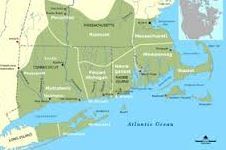
Massachusetts Bay Colony
|
The Massachusetts Bay Colony was an English settlement on the east coast of North America (Massachusetts Bay) in the 17th century, in New England, situated around the present-day cities of Salem and Boston. The territory administered by the colony included much of present-day central New England, including portions of the U.S. states of Massachusetts, Maine, New Hampshire, Rhode Island, and Connecticut. Territory claimed but never administered by the colonial government extended as far west as the Pacific Ocean.
|
|

Separatists
|
Separatism is the advocacy of a state of cultural, ethnic, tribal, religious, racial, governmental or gender separation from the larger group. While it often refers to full political secession, separatist groups may seek nothing more than greater autonomy. Some groups refer to their organizing as independence, self-determination, partition or decolonization movements instead of, or in addition to, autonomist, separatist or secession movements.[citation needed] While some critics may equate separatism and religious segregation, racial segregation or sexual segregation, separatists argue that separation by choice is not the same as government-enforced segregation and may serve useful purposes
|
|
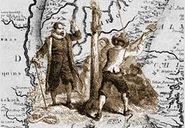
Non-Separatists
|
By 1620 the Pilgrims, those religious separatists who had fled persecution in England for the relative freedom of Holland, had become disgusted with the too-tolerant atmosphere they found there. So they decided instead to try their luck in the New World.
Around the same time, a group of Dutch fur traders called the New Netherland Company was looking for colonizers to populate New Netherland and challenge the English hegemony in the area of Jamestown and points north. The company petitioned the States General to allow the Pilgrims to colonize New Netherland under the Dutch flag. |
|
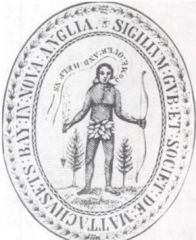
Fundamental Orders of Connecticut
|
The Fundamental Orders were adopted by the Connecticut Colony council on January 14, 1639 OS (January 24, 1639 NS). The orders describe the government set up by the Connecticut River towns, setting its structure and powers.
It has the features of a written constitution, and is considered by some as the first written Constitution in the Western tradition, and thus earned Connecticut its nickname of The Constitution State. John Fiske, a Connecticut historian, was the first to claim that the Fundamental Orders were the first written Constitution, a claim disputed by some modern historians. The orders were transcribed into the official colony records by the colony's secretary Thomas Welles. It was a Constitution for the colonial government of Hartford and was similar to the government Massachusetts had set up. |
|

Pequot War
|
The Pequot War was an armed conflict between 1634 and 1638 between the Pequot tribe and an alliance of the English colonists of the Massachusetts Bay, Plymouth, Saybrook colonies and their Native American allies (the Narragansett and Mohegan tribes). Hundreds were killed; hundreds of prisoners sold into slavery to the West Indies. Other survivors were dispersed. At the end of the war, about seven hundred Pequots had been killed or taken into captivity.
|
|
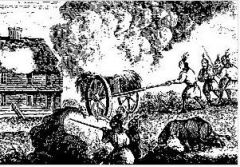
King Phillip’s War
|
King Philip's War, sometimes called the First Indian War, Metacom's War, Metacomet's War, or Metacom's Rebellion, was an armed conflict between Native American inhabitants of present-day New England and English colonists and their Native American allies in 1675–78. The war is named after the main leader of the Native American side, Metacomet, known to the English as "King Philip".
|
|
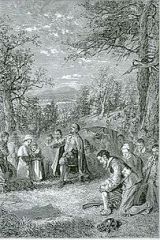
Thomas Hooker
|
Thomas Hooker (July 5, 1586 – July 7, 1647) was a prominent Puritan colonial leader, who founded the Colony of Connecticut after dissenting with Puritan leaders in Massachusetts. He was known as an outstanding speaker and a leader of universal Christian suffrage.
|
|
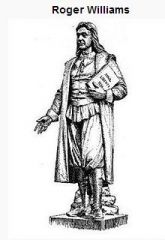
Roger Williams
|
Roger Williams was an English Protestant theologian who was an early proponent of religious freedom and the separation of church and state. In 1636, he began the colony of Providence Plantation, which provided a refuge for religious minorities. Williams started the first Baptist church in America, the First Baptist Church of Providence. He was a student of Native American languages and an advocate for fair dealings with Native Americans. Williams was arguably the first abolitionist in North America, having organized the first attempt to prohibit slavery in any of the original thirteen colonies.
|
|
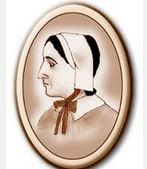
Anne Hutchinson
|
Anne Hutchinson, born Anne Marbury (1591–1643), was a Puritan spiritual adviser, mother of 15, and important participant in the Antinomian Controversy that shook the infant Massachusetts Bay Colony from 1636 to 1638. Her strong religious convictions were at odds with the established Puritan clergy in the Boston area, and her popularity and charisma helped create a theological schism that threatened to destroy the Puritans' religious experiment in New England. She was eventually tried and convicted, then banished from the colony with many of her supporters.
|
|
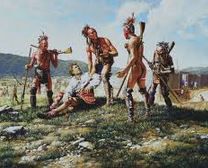
King William’s War
|
King William's War (1688–97), also known as the Second Indian War, Father Baudoin's War, or Castin's War was the North American theater of the Nine Years' War (1688–97, also known as the War of the Grand Alliance or the War of the League of Augsburg). It was the first of six colonial wars (see the four French and Indian Wars, Father Rale's War and Father Le Loutre's War) fought between New France and New England along with their respective Native allies before Britain eventually defeated France in North America in 1763.
|
|
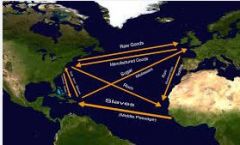
Triangle Trade
|
Triangular trade, or triangle trade, is a historical term indicating trade among three ports or regions. Triangular trade usually evolves when a region has export commodities that are not required in the region from which its major imports come. Triangular trade thus provides a method for rectifying trade imbalances between the above regions.
|
|
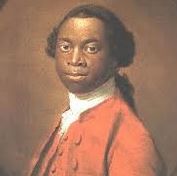
Olaudah Equiano
|
Olaudah Equiano (c. 1745 – 31 March 1797) also known as Gustavus Vassa, was a prominent African involved in the British movement for the abolition of the slave trade. He was enslaved as a child, purchased his freedom, and worked as an author, merchant, and explorer in South America, the Caribbean, the Arctic, the American colonies, and the United Kingdom, where he settled by 1792. His autobiography, The Interesting Narrative of the Life of Olaudah Equiano, depicts the horrors of slavery and influenced the enactment of the Slave Trade Act of 1807.
|
|
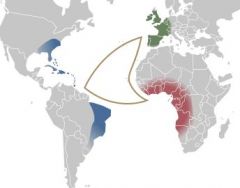
Middle Passage
|
The Middle Passage was the stage of the triangular trade in which millions of people from Africa citation needed were shipped to the New World as part of the Atlantic slave trade. Ships departed Europe for African markets with manufactured goods, which were traded for purchased or kidnapped Africans, who were transported across the Atlantic as slaves; the slaves were then sold or traded for raw materials,which would be transported back to Europe to complete the voyage. Voyages on the Middle Passage were a large financial undertaking, and they were generally organized by companies or groups of investors rather than individuals.
|
|

Stono Rebellion
|
The Stono Rebellion (sometimes called Cato's Conspiracy or Cato's Rebellion) was a slave rebellion that commenced on 9 September 1739, in the colony of South Carolina. It was the largest slave uprising in the British mainland colonies prior to the American Revolution.
|
|
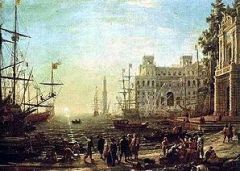
Mercantilism
|
Mercantilism is the economic doctrine that government control of foreign trade is of paramount importance for ensuring the military security of the country. In particular, it demands a positive balance of trade. Mercantilism dominated Western European economic policy and discourse from the 16th to late-18th centuries. Mercantilism was a cause of frequent European wars in that time and motivated colonial expansion. Mercantilist theory varied in sophistication from one writer to another and evolved over time. Favours for powerful interests were often defended with mercantilist reasoning.
|
|

Navigation Acts
|
The English navigation acts were a series of laws that restricted the use of foreign shipping for trade between England (after 1707 Great Britain) and its colonies, a process which had started in 1651. Their goal was to force colonial development into lines favorable to England, and stop direct colonial trade with the Netherlands, France and other European countries. The original ordinance of 1651 was renewed at the Restoration by Acts of 1660 and 1663, and subsequently subject to minor amendment. These Acts also formed the basis for British overseas trade for nearly 200 years.
|
|
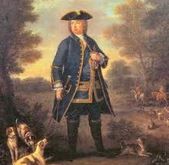
Salutary Neglect
|
Salutary neglect is a term used in American history, referring to an unofficial and long-lasting 17th- & 18th-century British policy of avoiding strict enforcement of parliamentary laws, meant to keep the American colonies obedient to England.
|
|
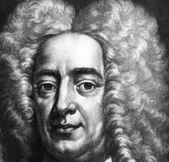
Cotton Mather
|
Cotton Mather, FRS (February 12, 1663 – February 13, 1728; A.B. 1678, Harvard College; A.M. 1681, honorary doctorate 1710, University of Glasgow) was a socially and politically influential New England Puritan minister, prolific author and pamphleteer; he is often remembered for his role in the Salem witch trials.
|

